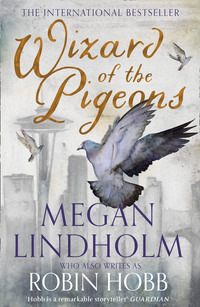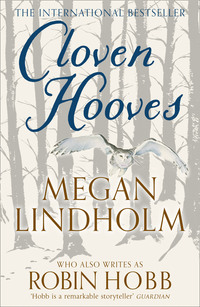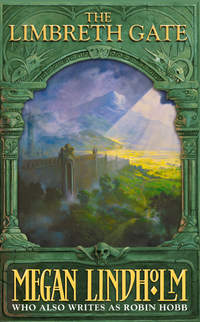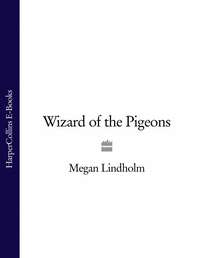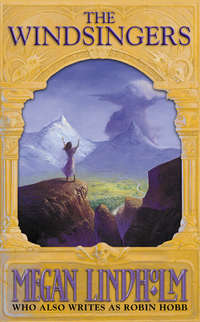
Полная версия
Cloven Hooves
Then the duck explodes in front of me, right before my feet, her brown pinions slashing my face as she rises on her battering wings. Her nerve has been shattered; she withstood the passing of Pan and Rinky so close to her nest, but I, a human, am too totally foreign to her experience. I fall back with an incoherent cry, my hands rising to protect my face, but she is already gone. My eyes tear from the slapping they have taken, but that is the sole extent of their damage. When I lower my hands and blink my eyes clear of tears, they are laughing at me.
Rinky’s pink tongue does loll now, mockingly, dangling over his picket fence of white teeth and his smooth black doggy lips. Pan is worse. He clutches his belly, bends over it, brown curls falling into his eyes as he shakes with silent hilarity. His teeth are very white, his mouth is wide with mirth. Miffed, I ignore both of them, and crouch to examine the nest.
The nest is a late one, probably the duck’s second effort this year. To the casual eye, it is empty. But with thumb and forefinger I lift the soft blanket of down that covers the fourteen pale turquoise eggs. The eggs are not much larger than grade-AA chicken eggs from the store, but they are much more real. Eggs from the store are cold and bony white, their surfaces dry and chalky, trapped in cardboardy trays. These eggs are warm, and smooth, almost waxy to the touch. I take two and Pan takes one, and we carry them off with us, leaving the duck free to return to her brooding.
We go back to the sunny bank of the dried-up slough and sit on the moss and eat our eggs. Pan and I bite the ends off ours and spit the crumpled bits of shell aside before we suck out the warm white and the sudden glop of the yolk. Rinky puts his between his front paws and delicately breaks it with his teeth so that he can lap up the egg and eat the shell that held it.
And that is all that there is to this day, but it needs nothing more. It is complete, like the scene trapped inside a glass paperweight, a whole sufficient to itself. I am eleven and lying there between a dog and a faun. We three make a circle, from human to beast and back again. I love them as I love my hands or my hair, unthinking, totally accepting. They are the two most important creatures in my life and always will be. When we grow up, I will be Pan’s mate and we will live and hunt in these woods and Rinky will always run beside us. I know these things as well as I know that the summer sky is blue and permafrost is cold.
THREE
Tacoma
May 1976
I hate to shop for clothing. I hate to try things on. I hate the cramped dressing rooms with curtains that gape at the sides, with their floors littered with straight pins and tags. I hate pulling stiff, unfamiliar clothes on over my head, clothing ensorcelled with hidden pins and buttoned buttons that snare me inside their unyielding depths. I hate standing nine inches from a full-length mirror trying to see what I look like in this foreign garment, my hair mussed and my makeup smeared by my struggle to get into it. It makes me sweat.
Stupid. Stupid is how I look. The bosom gapes hungrily for my nonexistent cleavage. My socks-and-sneakered feet stick out the bottom where sheer-stockinged calves and slender ankles and chic white sandals should be. I smooth the dappled-leaf muteness of the fabric, loving it, wishing I could look as if I belonged in it. But I cannot. I look like a homely carnival Kewpie doll stuffed into Barbie’s prom dress. Ken would be horrified. I claw and fumble the buttons open, begin an attempt to slither out the bottom of the dress. It jams on my too-wide shoulders.
A saleslady whisks the curtain open. My olivine eyes peer at her from the dress bodice, my pale thighs goosebump in the sudden draft. “Oh, dear,” she says, and I am sure her sympathy is for the dress, not me. “You didn’t like it. Can I bring you a different size, perhaps? Would you like to try it in another color?”
Another body, I think. Another face. Bring me those, and I’ll try the dress again. “No, thank you,” I say aloud, and her eyes narrow with disapproval. She must be on commission. Mother Maurie and Steffie trip merrily past my compartment. They are having a wonderful time. Both my mother-in-law and my sister-in-law love the gay whirl of shopping, adore endlessly trying on clothes, just for the fun of seeing what they will look like. I, exposed still, shiver as they pass. Another saleslady trails them, her arms heavy with bright garments. “Evelyn,” Steffie calls without pausing. “We are absolutely starved! We’re going to that restaurant, you know, the one down near Fredericks? Okay?”
“Okay,” I mutter. I don’t know the restaurant, having never been there. I am not even absolutely sure where Fredericks is. It doesn’t matter. I’ll cope. The dress has a half nelson on me. My saleslady sighs and whisks herself off to another dressing compartment. She peeks into that one, exclaims delightedly, “Not everyone can wear that look, but, oh, on you!” She clasps her hands delightedly.
I free a hand and arm somehow, and tug the curtain back so that it gapes no more than three inches on each side. I inch painstakingly out of the dress, making a sincere effort not to tear the shoulder seams. I shiver in my underwear as I wrestle it back onto its hanger and suspend it from the hook in the dressing room. Once on its hanger, it resumes its original gentle lines, looks beckoningly lovely as it never will on my frame. I snarl at it as I stoop for my jeans and shirt, catch the snarl reflected in the mirror. For a brief instant I am eye to eye, fang to fang, with myself. It is not a pleasant experience.
Someone who once said he loved me compared me to a stag. An odd compliment, and not one that reassures one’s femininity. But a compliment, nonetheless, to be collected and clung to. I straighten and look at myself in the mirror, trying to find the stag he saw. I see only pieces of myself, I cannot perceive myself as a whole. Sensible cotton panties that magically guard me from yeast infections. Legs that remind me of the dark, footed legs of my great-grandmother’s piano bench. I can see the lines of my ribs. There are muscles in my belly, good, that is good. I think. Maybe it isn’t. Maybe it isn’t feminine. How do you get rid of muscles on your belly? I wonder idly. My stubborn breasts have refused to follow me into womanhood. They are a seventh-grader’s breasts, their disgrace hidden inside smooth cups of foam-lined nylon that bring them almost to woman size. My collarbones stand out, my shoulders are wide, my neck is long and graceful. Is this the stag he saw? I roll my shoulders, watch the smooth muscles move under the skin. My face. I cannot see my face. I see the lines in my forehead, I see my wide cheeks, I should have plucked my eyebrows, the lipstick looks silly on me, not a clown’s mouth, no, more like I have eaten something unwholesome and it has stained my mouth this wretched color.
“Can I show you anything else?” It is the saleslady, peering in at me. She can show me nothing that I have not already seen. I clutch my jeans and shirt to myself.
“No,” I mutter. “Thank you, no, not today. Thank you.”
She leaves again. I wonder if someone is waiting for this dressing room. A tall, elegant woman, garments draped gracefully over her arm, folded money inside her pocketbook. Her high cheeks smooth as polished wood, salesladies never wrench her curtains open. Things like that are reserved only for those like myself.
Stop making yourself miserable, I scold myself. Why stop, I respond, when I do it so well? Everyone should be good at something. I pull on my jeans. Wranglers, size nine, as familiar as my own skin and more becoming. My shirt. A plain and simple button-up-the-front blue shirt, tuck it in, zip my fly and button it, buckle the leather belt. Better than armor and buckler is a pair of jeans that fit well, a leather belt that buckles snugly, a blue work shirt that doesn’t pretend to be anything else. I button my cuffs, and grin at myself in the mirror. Better. I take a worn tissue from my jeans pocket, smear the lipstick from my mouth. Better and better. I feel more like myself.
There are bright plastic sacks laden with trove collapsed in the corner of the dressing room. I gather them. Sears, The Bon, the 3-5-7 Shoppe. Mother Maude’s and Steffie’s bags, full of dresses and shoes and … No. Gay little frocks, and bright sling-back pumps and sun togs and beach cover-ups. Maurie and Steffie would never buy anything so mundane as dresses and shoes. I smile at the thought. Their bags hang on my arms, cut into my wrists as I hurry down the wide avenue of the mall, looking for them.
I am not good at malls, either. Steffie has tried to make me feel at home in them, but it does not work. They are too foreign to my experience. She swims through them as easily as a tropical fish glides through its pebbled and planted tank. But I am constantly distracted, bombarded by their infinite variety. There are too many possibilities, too many things to buy. Usually, I buy nothing simply because I cannot decide what to choose. Steffie selects effortlessly from the racks, tries a dozen garments, and buys two, never worrying that perhaps in the next store there will be a dress even more fetching, slacks even more flattering to her derriere. I envy her that certainty. I know I will never achieve it.
I slow, or try to. The stream of moving people pushes me on, so I continue down the mall. Perhaps I mistrust places where the sun never shines, where time stands still and the weather never changes save for the window displays. I lose all sense of direction, all ability to make decisions. Streams of people move both with me and past me. Sometimes I feel giddy and wonder if I am standing still while they pass. But here I am, at the end of the mall, and it is the wrong end, Fredericks is at the other end of the mall. I about-face and begin the trek back.
I wonder if Mother Maurie and Steffie will be impatiently waiting for my arrival. Or will they order without me, and begin their meal with no more thought than they give to a cockapoo waiting outside in the car? I have been a member of their family for six years. What is wrong with me that I cannot feel toward them as I should, cannot be free and easy as if I were really part of their family? It’s not them. It cannot be their fault. They are always correct, always calm and composed, always kind. Steffie is so polished, so incredibly perfect in all her roles. Today she is the fashion-conscious woman of the world. And Mother Maurie is, as always, perfect in the supporting role of “Steffie’s Mother.” I know I am jealous of them and the easy way they fit into this place. I know they do not intend to make me feel awkward and homely and provincial. But they do.
I am halfway up the mall when it happens. From out of nowhere, a man’s arm around my waist, closing tight, pulling me from the stream of shoppers as easily as a bear hooks out a salmon from a spawning run. He is a rapist, a ritual killer, a mugger, and I am too startled to even speak, and then a voice by my ear says, “Evelyn.”
I have never heard his voice before, so how do I know it? Is it the way he says it or the timbre of his throat that slackens my muscles, leaves me standing in the circle of his arms like a doe poised in oncoming headlights, my smile as blank as the mannequin’s watching us from the display window?
He grins at my expression, his brown curls falling into his eyes, his teeth very white, his mouth wide with mirth. He holds me in the backwater of his arms, safe from the current of mindless shoppers that brush past us. He is taller than I remember, and his eyes a more honest shade of brown. We stand without speaking, and I have the eerie sense of a circle completed.
He leans forward then, his mouth by my ear. His breath is warm. He smells like the summer forest, like wild raspberries and leaf mold, like tamarack trees and high-bush cranberry blossoms. Like Alaska. “I was afraid you had forgotten me,” he says, his voice like the wind through branches. “But you haven’t. Not any more than I’ve forgotten you. I’m still here. If you need me. If you want me.”
“I …” It is all I can manage. The mall is suddenly a cardboard set for a pretentious play. It cannot contain me. I need not act the part that has been assigned me. I could knock over the stucco wall, step out into daylight and wind and forest. Step back into being whole and belonging to myself.
“Come with me,” he urges me. His fingers track down my spine. “Now. Come back.”
I want to. In that instant, I really want to. But a jaw trap holds me fast. Boundaries spring up around me. The mound of laundry left unfolded on the table at the guest house. The refrigerator needs defrosting. Things I should do, things I meant to do, things I must do before I can call my time my own. Commitments. Duties. Things that make me real. Oh, and people. Belatedly, I remember people. I have a small son, a husband. They depend on me. They love me. What would they think of me if I just ran away like this, abandoned my responsibilities? Who would respect me if they didn’t need me? Who would I be, shorn of them? And I, don’t I love them, aren’t they my whole life? How could I even think of leaving them, even be momentarily tempted? The thought shocks me. I’ll tell him all this, tell him I am happy where I am, that there isn’t room for him in my life anymore. That I don’t need him anymore.
“I …” I repeat, choking on the word.
“Come soon, then,” he invites me, sure of my assent. His forefinger touches my jaw, a fleeting farewell.
Then he releases me, and he is gone, blending in with the flow of people. I stare after him. He wears only a denim vest over his bare chest, and cutoff jeans do little to mask his strangeness. His hooves clack clearly on the smooth linoleum of the mall floor, but no one notices him, no heads turn to watch him pass. Only I stare after him as he is borne away by the current of shoppers. I hear his hooves long after I lose him in the rippling tapestry of people.
I close my eyes, try to still the quivering that besets me. Glass cold against my sweating hands, smooth against my back. I realize that I am backed against a display window, leaning against the cool pane. I straighten guiltily. My palms leave their imprints outlined in mist on the smooth glass. The bags of garments have fainted, have crumpled about my feet. Absently I pick them up, smoothing their sides. All my many minds are chattering at once. Someone is hoping that Maurie and Steffie will not notice how crumpled the bags are. Someone else is shouting that he spoke to me, that he uttered my name, that I have finally heard his voice. But the one in charge hushes all of them, tells them to be still. Firmly I tell myself that I have been daydreaming again, silly escapist fantasies to make myself feel important, and that if I don’t hurry up and get down to the restaurant … I am not sure just what will happen if I don’t get down to the restaurant soon, but I have an oppressive feeing that it will be dreadful. The chance for something to be wonderful has come and gone in a heartbeat, and I have missed it. Only the dreadful is left. So I go, sacks swinging with my stride, moving purposefully now, cutting in and out of the crowd like a freeway driver weaving among the slower cars. I try not to think I am disheveled, guilty, musky with secrets. I forbid my eyes to watch for him.
The restaurant is a dark cave that opens up suddenly in the wall of storefronts on the mall. There are no doors, there is only the open space with the rack of menus, the cash register, and a hostess standing guard. Beyond, all is dimness and muted music. The tables are shrouded with deep red cloths, the menus are gilt and scarlet, the place is cushioned with a red carpet. One wall is mirrored, but it takes some moments for me to realize this, to see that I have been scanning the mirrored tables for a glimpse of Mother Maurie and Steffie. The hostess does not approve of me, and makes no attempt to greet or seat me. I am used to such as her. “I’m meeting someone,” I say, and breeze past her, trying in vain to keep my bags from brushing the backs of chairs and catching on the corners of tables.
Just when I am sure they are not here, that there must be another restaurant near another Fredericks, I see them. They are sitting in a booth at the very back, looking cool and chic in their summer city dresses, an advertisement for champagne or lip gloss. I stack the bags against the end of the booth and slide in beside Steffie. I realize I am breathing as if I have run a footrace. I push the hair back from my face and feel the sweat wet on my palm. I don’t believe Steffie has ever sweated in her life, and she stares with frank amusement as I wipe my palm over my forehead and then slide my hand down the leg of my jeans.
“Did you get lost?” Steffie asks kindly.
“A bit,” I admit. “I always get turned around in malls.”
“Oh, me, too,” she lies companionably. She is perfect, as Steffie is always perfect. She wears a perky little outfit that reminds me of tennis whites, made dressy by her earrings and the slender bracelet on her graceful wrist. She dresses to go shopping with more care than I dressed for my wedding. Her skin is golden tan; her huge eyes are brown; if I were a man I would kneel at her feet.
In the silence that follows, Steffie takes a long sip of her drink. I cannot help but feel it is a thing she has been taught to do, that at some point in her adolescence Mother Maurie sat her down at the kitchen table and taught her just the way to sip discreetly from a tall glass of iced tea. She does it too well for it to be an accident of nature. I watch her as the naked brown savages must have watched Magellan claim their lands. The same awe and incomprehension. She glances at Mother Maurie and then back to me. Then she clears her throat, having selected a suitable topic for conversation with me. What, I wonder, were they discussing before I arrived? And why are they so painstakingly kind to me, when I obviously do not belong to their world?
“Did you decide to buy that green dress you were trying on? We didn’t mean to hurry you, but I was simply dying of thirst. I hope you don’t mind.”
“No, not at all,” I lie, half a lie. What I would have minded even more was if they had waited for me outside the dressing room, chirping helpful comments. Sometimes they do that. I suspect they believe that if they had enough time and money, they could fix me. Like detailing a used car for resale. Cut my long unruly mane into something cute and perky, dress me in cunning outfits that disguise my unshapely legs and flat chest. Transform me into a wife worthy of Tom Potter. The idea terrifies me. It makes me talk too much, too fast. “I didn’t get the dress. At the last minute, I decided it was just too young for me. And I always feel naked somehow in a sleeveless dress.”
“You make yourself sound like an old lady,” Mother Maurie chides smilingly. Her smile seems a bit stiff. Suddenly I realize that my remarks have not been exactly tactful. The dress I have rejected is cut very similarly to the one Mother Maurie is now wearing. But on her its youthfulness looks appropriate. Mother Maurie is a tiny, delicate woman, a ceramic doll with large blue eyes, and Steffie is a long-legged golden blonde, a beach-party Barbie. It strikes me that they are the two ends of the spectrum for American femininity, and that I do not fall anywhere between them. Off the bell curve, that’s me.
“What are you having, Mother?” It is Steffie, considering a red-and-gilt menu. “Shall we have just a bite, or dinner?”
“Let’s go ahead and eat dinner. The boys will be ravenous when they get here, and it will save us the trouble of cooking and dishes at home.”
I smile and nod, pushing my tangle of brown hair back a little from my eyes. The boys, I think as I peruse the menu, the boys. And we are the girls, at least Maurie and Steffie are. The boys are her husband, my husband, her brother, her son, and my son. And yet there are only three of them. Eliza, Elizabeth, Betsy, and Bess, the old nursery riddle-rhyme rushes unbidden into my mind. Five names for three men. Or boys, I mean. All boys, forever boys. And we are the girls forever. Even when Steffie gets around to getting married and settling down, she will still be a girl. And probably a virgin, as near as I can make out. All the women in their family are virgins, except when they are “in a family way.” Then Grandpa Potter’s teasing is vigorous and crude beyond my belief or endurance, as if they were children caught in a dirty game.
I order and eat mindlessly, finishing while they are still dividing sandwiches into dainty triangles, still nibbling small forkfuls of cottage cheese. I drink coffee to pass the time, adding more sugar and creamer each time the waitress refills my bottomless cup. I roll the empty sugar packets and the foil-lined creamer packages into tiny tubes, and make stars and hexagons and parallelograms on the tabletop. Infinitely amusing. Only boring people get bored, my mother used to tell me. “… any other errands for you, Evelyn?” I jump, and sit up straight in my chair. Both Steffie and Mother Maurie are staring at me, polite inquiry in their eyes. Sleeping in school again.
“I, uh, I want to stop at the music store and look at the tapes.” Suddenly it seems like a very juvenile errand. As well to say I was stopping by the candy store, to get red and green suckers and a handful of Double Bubble. I am embarrassed, and they know it.
“You and your music!” Mother Maurie gives a condescending snort of laughter. “All right, but you’ll have to do it while we’re in the drugstore picking up Tommy’s prescription. Did you remember to bring it?”
She goes right on talking as I dig through my purse, finally coming up with the small empty pill bottle for Tom’s allergy medication in my coat pocket. It is sticky, Teddy must have played with it, and I surreptitiously wipe it on my napkin before I hand it over. I try to find the threads of the conversation again, only to realize no one is talking, they are all waiting expectantly.
The men are here, and I don’t know how or when they’ve arrived. Grandpa Potter, stooped but daunting still, rests his big hands on the edge of our table. His eyes scan the table, feasting on his wife and perfect daughter. He is given to saying things like “The Potter men have always been proud to say that their women dressed well, no matter how bad the harvest has been. We take care of our women.” His eyes skid over me, roll briefly toward heaven. He is a strange old man, I think, proud of his wife’s and daughter’s gentility and polish, but equally proud of his own rough edges and crude ways. He never minces words, never worries about giving offense. Of all Tom’s family, Grandpa is the one who never bothers to hide that he does not understand me, does not believe I will ever quite fit. He scares me, and I wish I could hide that from him. Right now, I want to sink under the table to escape that sharp stare. But suddenly Tom pushes into the seat beside me, his thigh warming against mine, and instantly all is well, no price is too great to pay for possessing him. Tall and golden he is, blond hair, brown eyes, big hands, and one big hand surreptitiously strokes my thigh before coming to settle demurely on the tabletop. He smells of Old Spice tinged with diesel oil, the mechanic’s smell that never quite leaves his skin. The hostess has followed them to the table, and I feel her eyes move from Tom to me and back again. She does not understand it any more than I do, why does this man who looks like a cigarette billboard cowboy, this gorgeous perfect man, sit down beside a woman like me? I move closer to him, and set my hand atop his on the table. The hostess looks away, moves away. I take a breath. I am safe now. My Tom is with me.
My Teddy is with him, clinging to his grandpa’s hand, his small head looking defenseless, his hair newly shorn and slicked. I don’t like it, and for a moment my anger flares, who does that old man think he is, always carrying out his compulsion to “keep those boys looking like boys” upon my little son? No one asked me if he needed a haircut. I love his dandelion tuft of fine hair, I don’t care if it covers the tops of his small pink ears. But Teddy is looking at me, his brown eyes big and round. He has been brave this time, not flinching when the buzzing razor nibbled down the back of his unprotected neck. I smile at him and try to put my approval in it, try not to remember how, when we first arrived in Washington, Grandpa took him to the barber, without my knowledge or consent, and brought him back, red-eyed and disgraced. “Momma’s little tit cried when the barber tried to shave the back of his neck and over his ears. Well, no grandson of mine is going to run around looking like a goddamned hippie. You wanna be like that, you stay with your mommy, baby boy. I’ll tell you, no son of mine ever behaved like that in public! Five years old, and he acts like a goddamned baby.”



